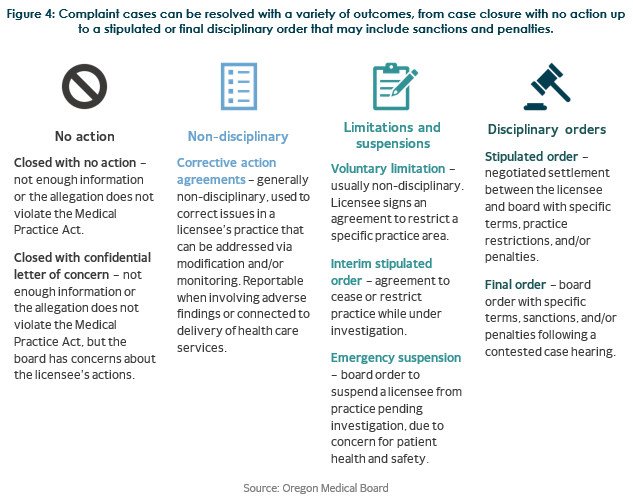State audit finds health care regulators need to improve fair, equal and consistent discipline of health care professionals

SALEM, Ore. (KTVZ) — The Oregon Medical Board can do more to ensure it disciplines health care professionals fairly and consistently, according to a new audit released Wednesday by the Oregon Audits Division.
OMB regulates health care professionals in the state of Oregon under Oregon’s Medical Practice Act. The primary mechanism by which this happens is licensing health care professionals, investigating complaints, and disciplining any licensees who violate the Act. The board receives between 700 and 800 complaints each year.
Auditors found many opportunities for the board to better standardize its disciplinary process to ensure all licensees are treated consistently and equitably. Auditors did not review individual complaints or make judgement calls on their results, but focused on complaint outcomes on a systemic level.
Ensuring consistency can be tricky. Medical complaint cases are often complex with unique circumstances that affect the outcome. Two allegations may appear to be similar but have entirely different outcomes based on the details of each case.
For instance, say two patients encounter similar complications with a specific type of surgery. One patient was already in a poor state of health before the surgery. The other patient was in good health, but had a surgeon who lacked experience, or had a prior history of negligence in patient care. This could result in very different board decisions for each physician.
However, it’s important OMB be consistent and equitable in its regulation of health care professionals to protect patients — as well as providers — and maintain public trust.
“Regulations are often talked about as rules to follow to protect people who receive services,” said Audits Director Kip Memmott. “But effective regulation also protects those providing the services. When it comes to regulations that affect public health, people need to have confidence those rules are being implemented equitably and effectively.”
In 2021, the Centers for Disease Control officially declared racism a serious public health threat. Racism affects an individual’s ability to obtain housing, education, employment, and wealth — factors which experts refer to as the social determinants of health. Racial and ethnic minority populations experience higher rates of poor health and disease in a range of health conditions, such as diabetes, hypertension, obesity, asthma, and heart disease. These disparities persist even when controlling for socioeconomic and other factors, such as income and the quality of health insurance coverage.
If licensees are disciplined inequitably, especially as a result of discrimination or even unconscious bias, it can limit the representation of people of color in medical professions. This can contribute to continued disparities in medical treatment and health outcomes for these communities.
Auditors also pointed out OMB needs to be able to gather more holistic data. Currently, the board’s data system doesn’t capture complaint information in a way that allows it to easily analyze disciplinary decisions. Improving on that database would allow OMB to conduct routine, systematic data analysis to assess whether outcomes are consistent and equitable across similar cases.
Read the full report on the Secretary of State website.
About the Oregon Audits Division
The division exists to fulfill the Secretary of State’s constitutional and statutory audit authority. We do this by auditing to protect the public interest and improve Oregon government. Our vision is to be the source of independent, reliable, useful, and timely information on state government operations and programs for the Governor, Legislature, and people of Oregon; and to provide transparency and accountability for the use of public resources.
About the Oregon Secretary of State
The Oregon Secretary of State is one of three constitutional offices created at statehood. Oregon’s Secretary of State is Oregon’s chief elections officer, chief auditor, chief archivist, and oversees business and nonprofit filings. The Secretary of State also serves as one of three members of the State Land Board and as the chair of the Oregon Sustainability Board. Under Article V, Section 8a of the Oregon Constitution, if there is a vacancy in the office of Governor, the Secretary of State becomes governor. As an independently elected constitutional officer, the Secretary of State answers directly and solely to the people of Oregon.